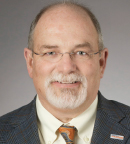
W. Charles Penley, MD, FASCO
A Partner at Tennessee Oncology, PLLC, W. Charles Penley, MD, FASCO, has been an ASCO member since 1988. He has served on the Conquer Cancer Foundation Board of Directors since 2005 and currently holds the role of Immediate Past Chair.
What led you to oncology?
WCP: While it may sound silly to say it today, in light of the amazing discoveries of the past few years, the mid-1980s were exciting times in oncology. Curative chemotherapeutic regimens had been developed for many malignancies that had, just a decade or so previously, been routinely fatal. New agents and dose-intensive regimens were being developed, and the science of bone marrow transplantation was coming into its own. As a medical resident, it was hard not to be excited by these developments.
I was also drawn to a specialty that allowed me to take care of the whole patient and not just focus on one organ or system. Patients diagnosed with cancer face complex physical problems, but there are psychological and socioeconomic issues to be considered as well, and I’ve been challenged and humbled while assisting patients and families to find solutions to those problems.
What changes do you envision for the field in the next 10 years?
WCP: That is difficult to predict, given the current frenetic pace of scientific discovery. It seems likely that we will continue to focus on the genome and that we will find new targets and develop more effective, less toxic therapeutic agents. I’d like to think, however, that we would focus more on the prevention of neoplastic disease. While we will likely never eradicate cancer as human illness, identifying greater numbers of genetic and environmental risk factors and developing more effective risk-reducing strategies seem within reach.
What would you say to a young physician thinking about entering the field of oncology?
WCP: I would say that the same factors that drew me to the field exist today. The science is exciting, and knowledge is rapidly expanding. There is a huge burden of human illness and suffering that demands our attention and best efforts. The field offers a young physician almost limitless opportunities to truly make a difference—and in the final analysis, that’s what we all should strive to do.
What career would you be in if you weren’t an oncologist?
WCP: I can honestly say that I didn’t set out as a young man to become an oncologist—many factors aligned to guide me down this path. I can just as easily see myself pursuing a career in the basic sciences, laboratory research, or teaching. I’ve often joked that my next career will involve opening an antique bookshop—there is just something comforting about the scent and feel of old books. ■
Originally printed in ASCO Connection. © American Society of Clinical Oncology. “Meet W. Charles Penley, MD, FASCO.” Connection.asco.org. February 23, 2016. All rights reserved.

